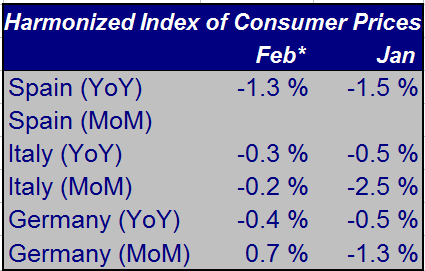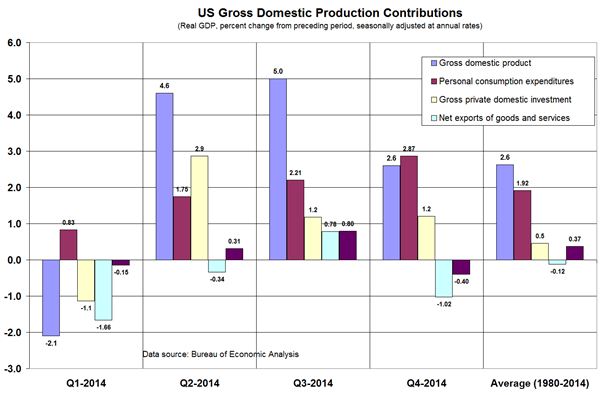Today’s data calendar is long and heavy with European releases, but none of them are hugely important for the markets. European Central Bank’s (ECB) policy-setting meeting next week (February 5) and the starts of the its bond purchase program should dominate next week, and this is probably keeping the EUR/USD under pressure during the next couple of sessions as well. Next week also sees the latest monthly US employment report.
Greece Q4 Provisional Gross Domestic Production (10:00 GMT): Usually, Greek economic data has little chance of actually moving the major markets. However, with the Greek bailout negotiations dominating European politics and the possibility of forced exit from the EUR, it might be different this time.
Greece's GDP is expected to have decreased by 0.2% after increasing 0.7% in the previous quarter. This would still leave the year-on-year growth figure at 1.7%. It is difficult to say what effect the numbers would have on the markets - weak GDP growth could boost Greece’s negotiation position within the Eurogroup, but on the other hand it could also be interpreted as a sign that reforms and austerity have to be front-loaded.
Greek GDP is now back in focus, given its importance in talks to stay in Europe.
Also, Greek banks’ loans to the private sector in January will be reported at 10:30 GMT. In December, they fell 3.1% year-on-year.
European February Flash Inflation (08:00 GMT-13:00 GMT): Spain (08:00), Italy (10:00) and Germany (13:00 GMT) report the flash consumer price indices for February. In contrast to Greece, Spain’s and Italy’s numbers could actually be important, as both countries are “too big to fail”, and Spain is holding national elections in December, with an anti-austerity left-wing Podemos currently running high in the polls. 
Perhaps the markets might be fooled into thinking that deeper deflation could push the ECB to increase its efforts to maintain price stability, or that the European Commission could continue ignoring the budget deficits and violations of the European stability pacts. Thus, signs of a deeper deflation would be EUR-negative
I think it is much more probable that the ECB will not change its policy plans, as it would be politically extremely difficult. The naysayers can always argue that the effects will come later, and finally, the latest monetary data from the Eurozone published yesterday suggest that the credit crunch is ending and money supply is increasing.
US Q4 Gross Domestic Production second estimate (13:30 GMT): The consensus forecast is for a notable downward revision to the last year’s GDP data: 2% growth, after the advance estimate of 2.6% growth. The main culprit for the negative revision is “international developments”, which have led to a stronger USD and weaker sales for US exporters. Also, inventory build-up is expected to have diminished, but that should only have an temporary effect. 
Luckily, with improving labour markets and very confident consumers supporting the consumer spending, the GDP behind the headline numbers could be said to be healthier than the revision would suggest.
Yesterday the US January consumer price index showed prices had fallen by 0.1% from a year ago, but the core prices had held up well, and core durable goods orders were better-than-expected. While negative headline inflation is a nuisance, it does not necessarily stop the Federal Reserve from raising rates, perhaps as early as June, as long as the underlying fundamentals are in good shape.
To sum it up, the markets are now taking the possibility of the Fed’s rate hike seriously indeed, while the ECB’s actions are just about to begin. The EUR/USD’s breakdown from its recent trading range suggests the pair should remain under selling pressure at least until next week’s ECB meeting. In my opinion the lower US bond yields are not a sign of a “dovish Fed”, but rather the result of yield hunting from global investors. Note that the US Treasury 10-Year and 2-Year yield spread is at its lowest point since mid-2012, the point of the worst of the euro crisis.
That is the consensus – but looking at the bigger picture, the economic surprise indices of the US and Eurozone show the divergence between the two is currently larger than it has been for years. I expect a reversal – US data should soon begin to surprise positively, while Europe should bring in negative surprises.
